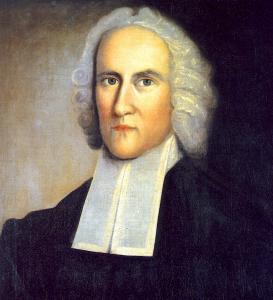 I came of theological age in the “young, restless, Reformed” heyday. The symbol, the emblem that graced the cover of the cover story of Christianity Today on this surging phenomenon, was a t-shirt that read “Jonathan Edwards is my homeboy.” I connected instantly with this movement when I read Collin Hansen’s explosive article. I won’t say that Edwards is my homeboy, but I will say that he is my favorite theologian and historical Christian figure.
I came of theological age in the “young, restless, Reformed” heyday. The symbol, the emblem that graced the cover of the cover story of Christianity Today on this surging phenomenon, was a t-shirt that read “Jonathan Edwards is my homeboy.” I connected instantly with this movement when I read Collin Hansen’s explosive article. I won’t say that Edwards is my homeboy, but I will say that he is my favorite theologian and historical Christian figure.
Today is Edwards’s birthday: October 5, 1703. Without further ado, here are three reasons to engage the life, ministry, and writing of Edwards.
First, Jonathan Edwards was a monumentally G0d-centered Christian. It’s funny, because people think of Edwards as this staid, sober figure. This he was in terms of public demeanor. But to read him is to encounter a man whose passion, three hundred years later, springs off the page. I don’t know any other way to put it than this: Jonathan Edwards loved God. He was entranced by God. The central aspect of his person, the core of his being, was God-centeredness. We need more believers like this. In point of fact, every believer should be like this. But a theologically deficient modern church turns out too few of this type. Part of the way back is to point people to God-centered people like Edwards.
Edwards was far from perfect, of course. He had a strong temper, and most significantly, he held slaves. This aspect of his legacy always takes me aback, just as encountering Luther’s anti-Semitism, Calvin’s complicity in the death of Servetus, Spurgeon’s penchant for melancholy, and Billy Graham’s hunger for political access leave us cold. But ironically, this is actually part of why we study church history generally and individuals like Edwards particularly: we know they are flawed. We want to see where they drifted. We are like them, and we want to confront our own shortcomings, and learn and grow.
Second, Jonathan Edwards had missionary theology. Edwards loved the lost. How strange; he is often portrayed as hateful. His sermon “Sinners in the Hands of an Angry God” is the most famous sermon in church history–the most famous extrabiblical homily, that is–and is usually, for 99% of those who read it, the only text they will ever engage of his. But “Sinners” does not show people what they think it shows them. “Sinners” tells the truth about the human condition. As recent events in Las Vegas have reminded us, the heart of man is desperately wicked. We all deserve to taste divine wrath. Because this is true, it is fundamentally loving to tell sinners the truth about their lost state, and point them to the mercies of Christ. This Edwards did.
Edwards, this rock-ribbed reformed theologian, not only preached the message, but lived it. He became a missionary in Western Massachusetts after being fired from his Northampton congregation in 1750. He also nurtured and mentored young missionaries like David Brainerd, editing Brainerd’s diary and making it the central non-biblical text of the modern missions movement. You cannot miss this irony: though Edwards and other “big God” theologians are charged with killing an interest in missions and evangelism, they actually fanned this interest into flame. I love that when I engage Edwards, I’m learning from someone who not only doctrinally believed in promoting the “new birth,” but who doggedly preached it.
Third, Jonathan Edwards wrote with grace and power. Edwards is, full stop, a beautiful writer. Among the Christian devotional tradition, only Spurgeon (and maybe Richard Sibbes) stands beside him as a spiritual guide. Again, most people read next to nothing of Edwards, which is the religious equivalent of living next to a Swiss bank that gives out free gold bricks and never visiting it. If you do read Edwards–especially his sermons–you will find his vision of God intoxicating, and his zest for holiness affecting, and his intellectual engagement with Scripture invigorating. Long before biblical theology became a hot discipline (as it justly is today), Edwards was doing it, often in one power-packed long paragraph.
In sum, you should read Edwards.
*******
I’m thankful that Midwestern Seminary student Tyler Sykora reminded me of the happy nature of October 5. Tyler took my class on Edwards here at Midwestern, and also heard me wax on and on (and on) about the pastor-theologian during the recent MBTS trip to New England that I led with Dr. Jason Duesing and Jared Wilson. If you want to read more on Edwards, you should buy the magisterial biography of him by George Marsden, the illuminating spiritual study by Iain Murray, this stirring consideration of his overarching ideas by John Piper, and the exegetical overview by my doctoral supervisor, Douglas Sweeney. Visit also the website of the Jonathan Edwards Center at Yale, and indulge yourself in hours of free Edwards resources from the world’s premier Edwardseanic repository.
For my very humble part, I had the inestimable privilege of writing this accessible five-volume collection on Edwards with Sweeney, The Essential Edwards Collection (Moody, 2010, foreword by Piper). These five short books continue to find an audience, I think because there are a good number of people who do want to read up on Edwards, but want some assistance in doing so.
In 2018, the 260th anniversary of Edwards’s death, I will publish two books on Edwards. The first is Always in God’s Hands: 365 Days with Jonathan Edwards (Tyndale House). This is a unique project in that it casts Edwards as a counselor of souls. The book is a devotional, a format that has shockingly almost never been tried since Edwards’s day. The format is simple: a paragraph from Edwards, and then explanation and application from me. Readers will see firsthand just how potent and affecting the pen of Edwards is (see point three above).
The second is The Essential Jonathan Edwards (Moody). Sweeney and I are publishing this one together. This single-volume work will clock in around 125,000 words and function as a readable guide to the major aspects of Edwards’s thought and ministry. It’s our hope that this book, like the preceding devotional, will only continue to aid in the ongoing Jonathan Edwards renaissance.
(Image: Wikimedia Commons)












